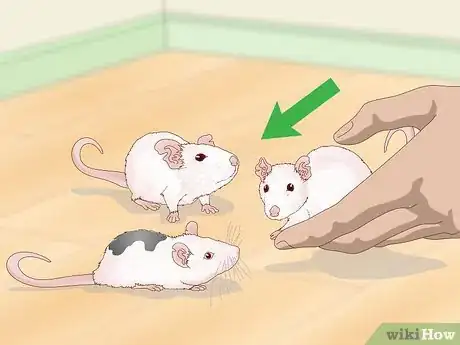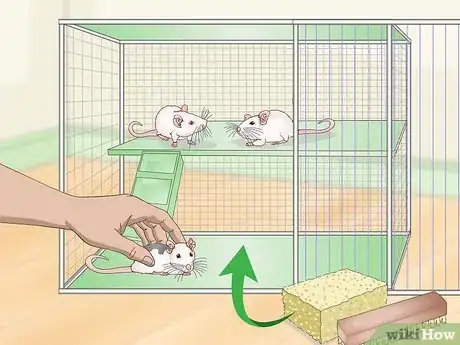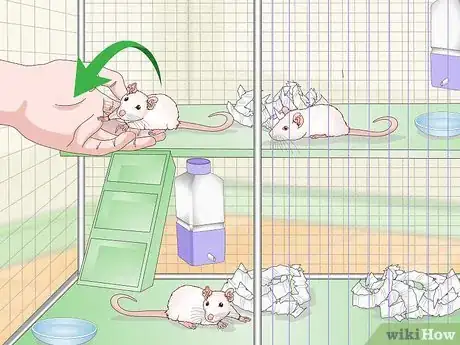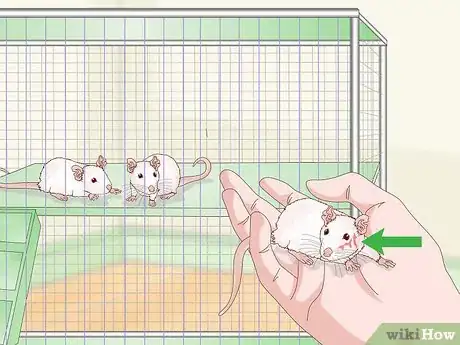This article was co-authored by Pippa Elliott, MRCVS. Dr. Elliott, BVMS, MRCVS is a veterinarian with over 30 years of experience in veterinary surgery and companion animal practice. She graduated from the University of Glasgow in 1987 with a degree in veterinary medicine and surgery. She has worked at the same animal clinic in her hometown for over 20 years.
This article has been viewed 38,947 times.
Having pet mice can be a real joy most of the time! They are fuzzy, fun, energetic little creatures. However, sometimes they can be aggressive toward humans and also toward each other. Knowing how to socialize your mice and prevent fighting are both really useful skills that will make having mice much more enjoyable and rewarding.
Steps
Socializing Your Mice
-
1Acquaint your mice with you. One of the best ways to stop mice from fighting before they even start is to make them comfortable with their new space. This will help create a calm, stress-free environment for your mice.
- Start by gently approaching your mice with a small treat to gain their trust.
- After doing this a few times you can try gently holding your mice under their stomachs.
-
2Bring your mice outside their cage to get them used to larger spaces. Mice love the confines of their cage where they can feel safe and secure. However, it’s important to gradually bring them into larger spaces to get them used to life outside their cage.[1]
- Always seal the room you let your mice out in by closing doors, windows, and ventilation shafts.
- Start with the same room that their cage is in as it will be familiar to them.
Advertisement -
3Introduce your mice to each other. Mice are really social animals and love living and playing with each other. However, they can have a tendency to be a little bit territorial and hierarchical.[2] Because of this, it’s important they learn from a young age how to play and live together.
- House mice together as soon as you get them.
- It’s usual for mice to play fight a little bit but if blood is drawn then the mice need to be separated.
-
4Use a new or newly-cleaned cage when introducing mice to each other. Mice form hierarchies in their cages. By using a new cage or one that has been freshly cleaned, you’ll be allowing the mice to form a natural hierarchy.[3]
- If you introduce a mouse to an already established hierarchy, there may be violence between some of the mice.
- Cleaning the cage thoroughly can act as a sort ‘reset’ button if your mice won’t seem to stop fighting.
-
5Separate a mouse that is being hurt or excluded. There are some clear signs to watch out for that indicate infighting. These can include:
- Scratches or marks on one or some of the mice.
- Exclusion from the sleeping area.
- Reluctance from mouse to engage in playtime.
Reducing Stress to Prevent Fighting
-
1Provide plenty of resources to reduce competition. If your mice have to compete for resources, then they will be more likely to fight. Make sure that there is enough nesting material for all of the mice and that they can sleep separately if they want to. Also, make sure that there are plenty of food and water bowls.[4]
-
2Handle mice with care and go slow. Reaching in quickly and grabbing a mouse may cause stress to the mice and lead to fighting. When you pick up a mouse, make sure that you do not reach in and grab it quickly. Go slow and put your cupped hand down into the cage. Then, let it climb onto your hand and slowly lift it out.[5]
-
3Buy female mice as they are much less aggressive than male mice. Female mice have less concern with social dominance and will often welcome a new addition to the cage even if it is not from the same litter.
- There are exceptions but this is generally true with all female mice.[6]
- Another small benefit is that female urine does not smell as strongly as male urine.
-
4Choose mice from the same litter together if buying male mice. Generally speaking, you should not buy male mice and house them in the same place. Males are highly concerned with social dominance and often get into fights.[7]
- Once a male adult is sexually active he will fight to the death against any other male he encounters.
- The only case where housing male mice together is possibly successful is when they are from the same litter. There is still a high chance of fighting, however.
Dealing with Fighting
-
1Transfer your mice to a new cage together if they are fighting. Much of the aggression that mice have is based on the familiar smells the mice have. They use these smells to remind them of their territory and where they fit in the group.[8]
- Mice will often express aggression when being transferred to a cage that has some familiar smells, but isn’t exactly the same.
- To counteract this, transfer the mice to an entirely new cage, with no objects from the old cage.
- This will allow the mice to form their natural hierarchy once again and hopefully stop the fighting.
-
2Separate the mice if blood is drawn. It’s normal for mice to like to wrestle and play-fight in the same way they wrestle with your hands. However, as soon as blood is drawn, it’s a sign that things are more serious.[9]
- It’s highly likely that this situation will only arise with two or more male mice.
- Because of this, if you are keeping male mice together, always keep a very close eye on them.
-
3Remove a troublesome male mouse if he is causing problems. Mice have a natural hierarchy and the aggressive mouse is most likely the dominant in the cage. Removing the mouse and putting it in a separate cage can be a good quick fix but it may pose other problems within the group.
- If there are other males left in the cage, a new dominant will likely emerge meaning there may be more fighting.[10]
References
- ↑ http://www.rmca.org/Resources/mousefaq.htm
- ↑ http://www.miceandrats.com/miceas.htm
- ↑ http://animalab.eu/sites/all/pliki/produkty-dopobrania/Reducing_Aggression_in_Mice_Tech.pdf
- ↑ http://animalab.eu/sites/all/pliki/produkty-dopobrania/Reducing_Aggression_in_Mice_Tech.pdf
- ↑ http://animalab.eu/sites/all/pliki/produkty-dopobrania/Reducing_Aggression_in_Mice_Tech.pdf
- ↑ http://www.miceandrats.com/miceas.htm
- ↑ http://animals.mom.me/age-separate-mice-6887.html
- ↑ http://animalab.eu/sites/all/pliki/produkty-dopobrania/Reducing_Aggression_in_Mice_Tech.pdf
- ↑ http://animals.mom.me/mean-mouse-squeaks-lot-11393.html







































































